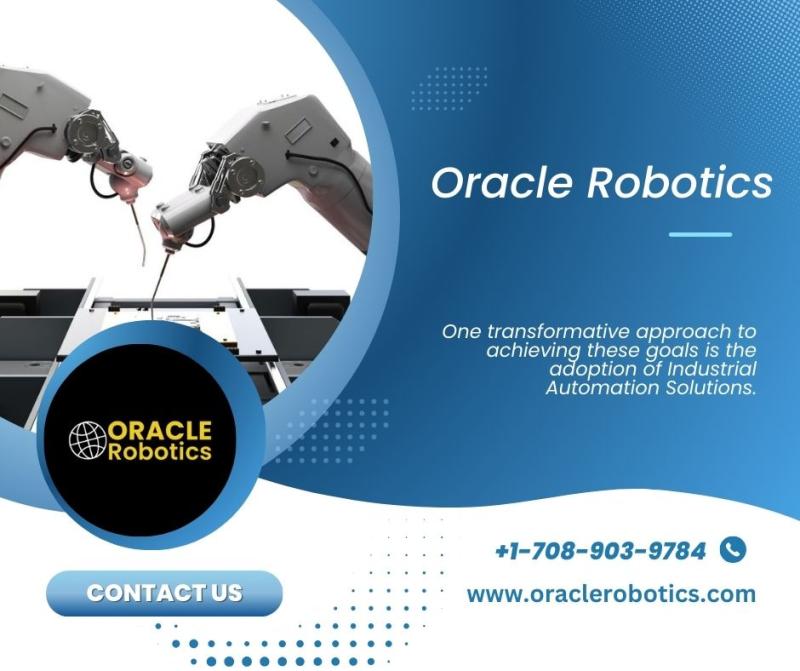How Industrial Automation Solutions Revolutionize Manufacturing Efficiency?

In today’s fast-paced and highly competitive global marketplace, manufacturers are constantly seeking innovative ways to improve efficiency, reduce costs, and enhance product quality. One transformative approach to achieving these goals is the adoption of Industrial Automation Solutions. By integrating advanced technologies such as robotics, artificial intelligence (AI), and the Internet of Things (IoT) into their operations, businesses can streamline processes, minimize human error, and stay ahead of the curve.
The Core of Industrial Automation Solutions
Industrial automation involves the use of control systems, such as computers or robots, to handle different processes and machinery in a manufacturing setting. Unlike manual operations, which rely heavily on human input, automated systems are designed to perform repetitive tasks with unmatched precision and consistency.
Industrial Automation Solutions encompass a wide range of applications, including:
Process Automation: Automating manufacturing processes such as assembly, welding, and painting.
Robotic Systems: Employing robots for tasks like material handling, packaging, and quality inspection.
Data-Driven Operations: Leveraging IoT and real-time data analytics to monitor and optimize production workflows.
These solutions not only enhance operational efficiency but also pave the way for innovative business models and increased scalability.
Key Benefits of Industrial Automation Solutions
1. Increased Productivity
One of the most significant advantages of industrial automation is the substantial boost in productivity. Automated systems can operate 24/7 without fatigue, ensuring consistent output and faster production cycles. By minimizing downtime and eliminating bottlenecks, manufacturers can significantly increase throughput.
2. Improved Quality Control
With automation, manufacturers can maintain high levels of accuracy and precision in their processes. Advanced robotic systems and sensors can detect and correct defects in real time, ensuring that products meet stringent quality standards. This level of consistency is difficult to achieve with manual labor alone.
3. Cost Reduction
While the initial investment in automation technology may seem significant, the long-term cost savings are undeniable. By reducing waste, minimizing errors, and optimizing resource usage, businesses can achieve higher profitability. Additionally, automation reduces dependency on manual labor, cutting operational costs related to training and workforce management.
4. Enhanced Safety
Industrial environments often involve hazardous conditions, such as exposure to chemicals, extreme temperatures, or heavy machinery. Automation helps mitigate these risks by delegating dangerous tasks to robots. This not only ensures worker safety but also reduces liability and insurance costs for companies.
5. Real-Time Decision Making
The integration of IoT and AI in automation allows manufacturers to collect and analyze real-time data from their operations. This enables proactive decision-making, such as predictive maintenance and demand forecasting, which further optimizes efficiency and reduces downtime.
Real-World Applications of Industrial Automation Solutions
The versatility of Industrial Automation Solutions makes them applicable across a wide range of industries, including automotive, pharmaceuticals, food and beverage, and electronics. Some notable examples include:
Automotive Manufacturing: Automation is used for assembling, welding, and painting car components with unparalleled precision.
Pharmaceuticals: Robots handle delicate processes such as drug formulation, packaging, and quality testing.
Food and Beverage: Automated systems ensure consistent product quality, efficient packaging, and compliance with hygiene standards.
Electronics: Automation facilitates intricate tasks like soldering and assembling small components.
The Role of Oracle Robotics in Driving Automation Excellence
As a leader in the field, Oracle Robotics is at the forefront of delivering cutting-edge Industrial Automation Solutions tailored to meet the unique needs of various industries. Our innovative technologies combine advanced robotics, AI, and IoT to empower businesses with smarter, more efficient manufacturing processes. Whether it’s integrating collaborative robots (cobots) into assembly lines or deploying IoT-enabled systems for real-time monitoring, Oracle Robotics ensures that our clients achieve unparalleled productivity and quality.
Overcoming Challenges in Automation Implementation
While the benefits of industrial automation are clear, businesses may face challenges during implementation. These include:
High Initial Investment: The upfront cost of automation technology can be a barrier for small and medium-sized enterprises (SMEs). However, the long-term ROI often justifies the expenditure.
Integration Complexity: Ensuring seamless integration of new systems with existing infrastructure requires careful planning and expertise.
Workforce Upskilling: Automation often necessitates retraining employees to work alongside advanced technologies. This can involve time and additional resources.
To address these challenges, companies should partner with experienced providers like Oracle Robotics, who offer end-to-end support, from system design to implementation and training.
The Future of Industrial Automation
The evolution of industrial automation is far from over. Emerging trends such as autonomous robots, machine learning, and cloud-based manufacturing are set to revolutionize the industry even further. These advancements will enable greater customization, smarter decision-making, and enhanced scalability for businesses.
Moreover, the rise of sustainable manufacturing practices highlights the importance of automation in achieving energy efficiency and reducing waste. By adopting eco-friendly technologies, businesses can not only improve their bottom line but also contribute to global sustainability efforts.
Conclusion
Industrial automation solutions are transforming the manufacturing landscape, enabling businesses to achieve unprecedented levels of efficiency, quality, and profitability. By embracing these technologies, manufacturers can stay competitive in an ever-changing market. Companies like Oracle Robotics play a crucial role in this transformation, offering state-of-the-art solutions that cater to diverse industrial needs. Whether it’s enhancing productivity or ensuring worker safety, industrial automation is undeniably the key to a smarter, more efficient future.
Comments